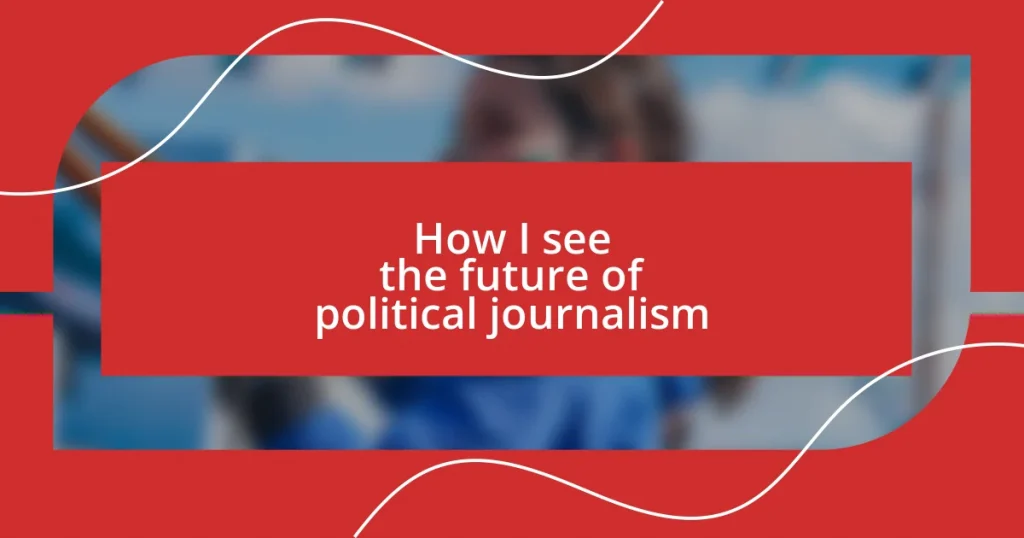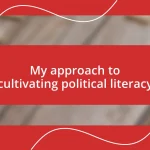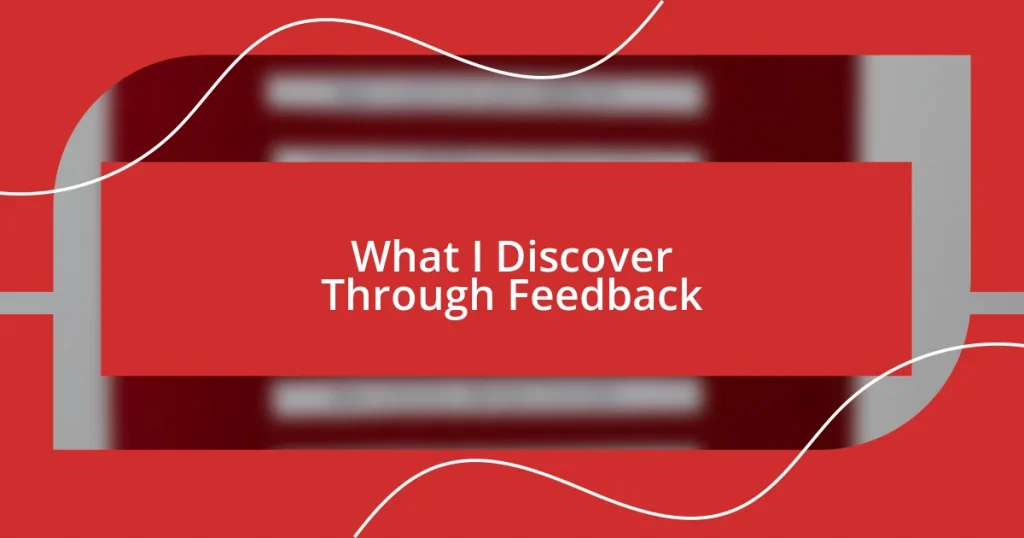Key takeaways:
- The rise of digital platforms and social media has transformed political journalism, enhancing immediacy but also contributing to polarization and challenges in trust.
- Emerging technologies like AI, VR/AR, and blockchain are reshaping journalism, providing tools for better reporting and enhancing transparency, but also raising questions about the balance between technology and human insight.
- Media literacy is crucial for combatting misinformation and fostering a healthier political landscape, empowering individuals to critically engage with news and demand higher standards from media outlets.
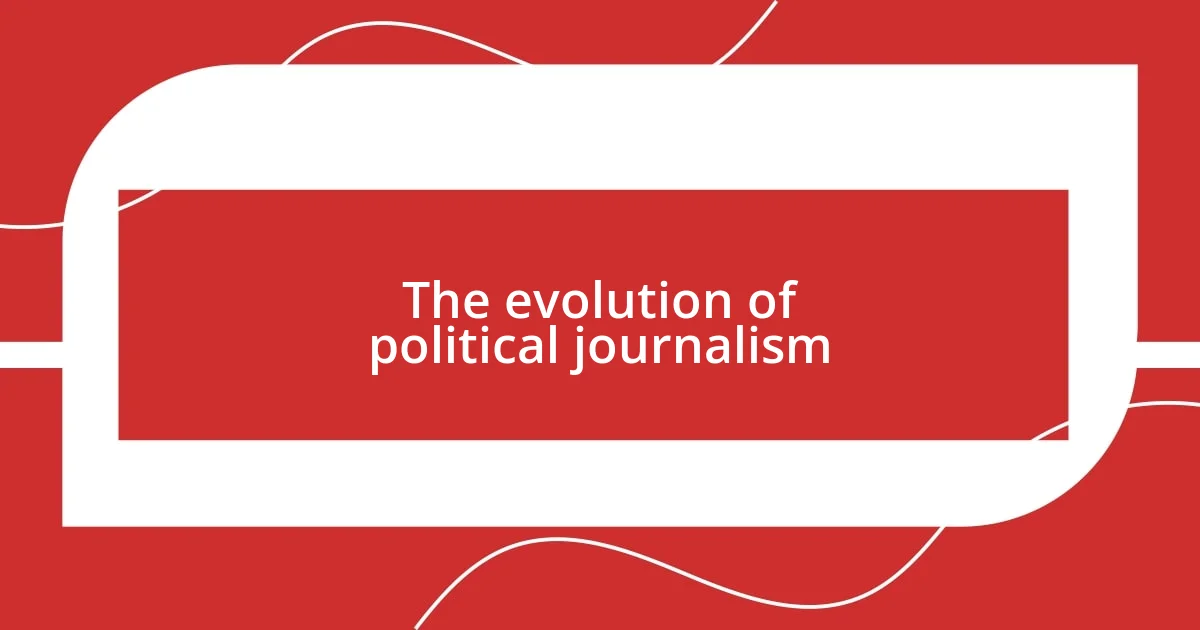
The evolution of political journalism
Political journalism has undergone a seismic shift over the past few decades. I remember watching the nightly news, eagerly anticipating a straightforward rundown of political events. Today, the landscape is so much more complex, influenced heavily by social media. Isn’t it fascinating how a tweet can spark a worldwide conversation in seconds?
As newspapers struggled to adapt, I witnessed firsthand how the rise of digital platforms revolutionized how we consume political news. The immediacy of online media means that journalists are not just reporting; they’re often participating in real-time debates. It makes me ponder how this new accessibility impacts our understanding of nuanced political issues.
I’ve found that the evolution has also deepened the polarization in political reporting. With the advent of blogs and opinion pieces, it seems like everyone now has a platform to share their views. How does this affect our trust in traditional journalism? It’s a crucial question, reflecting my concerns about the authenticity and objectivity of the information we receive today.
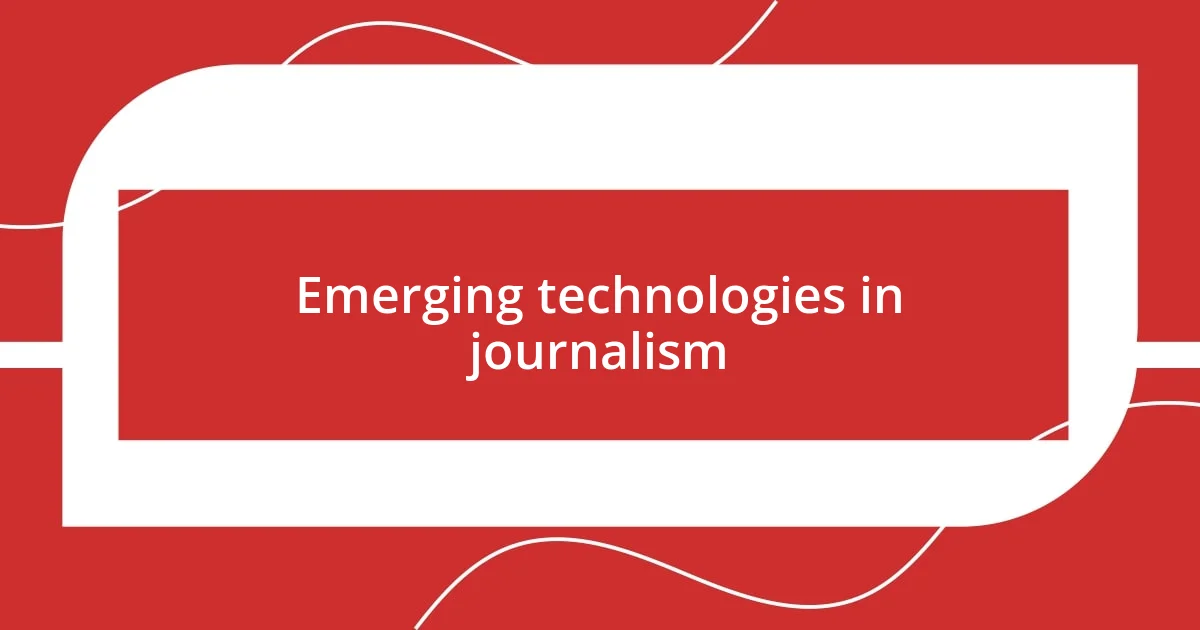
Emerging technologies in journalism
As emerging technologies continue to shape journalism, I’ve seen how tools like artificial intelligence and data analytics are revolutionizing news reporting. I remember attending a workshop where we explored AI’s capabilities in quickly sorting through massive data sets to identify trends in political discourse. It struck me how these technologies can enhance the accuracy of reporting, yet I can’t help but wonder about the implications for investigative journalism. Will the human touch be overshadowed by algorithms, or can they coexist harmoniously?
Another aspect that captivates my attention is virtual reality (VR) and augmented reality (AR). Imagine being able to immerse yourself in a political event or experience a debate from multiple perspectives, all in real-time! I recall a recent VR simulation of a town hall meeting that allowed participants to interact directly with the candidates. This integration of immersive experiences in journalism isn’t just innovative—it could fundamentally change how we engage with political content and shape our opinions.
Lastly, the rise of blockchain technology in journalism presents a fascinating frontier. I’ve engaged in discussions about its potential to provide transparency and ensure the authenticity of information. The ability to track the origin of a news story could restore some degree of trust among the public, which I believe is crucial in today’s environment, where misinformation is rampant. How will this technology reshape our relationship with the media? It’s an exciting prospect to consider.
| Technology | Impact on Journalism |
|---|---|
| Artificial Intelligence | Enhances data analysis and accuracy of reporting. |
| Virtual/Augmented Reality | Creates immersive experiences for audience engagement. |
| Blockchain | Increases transparency and trust in news sources. |
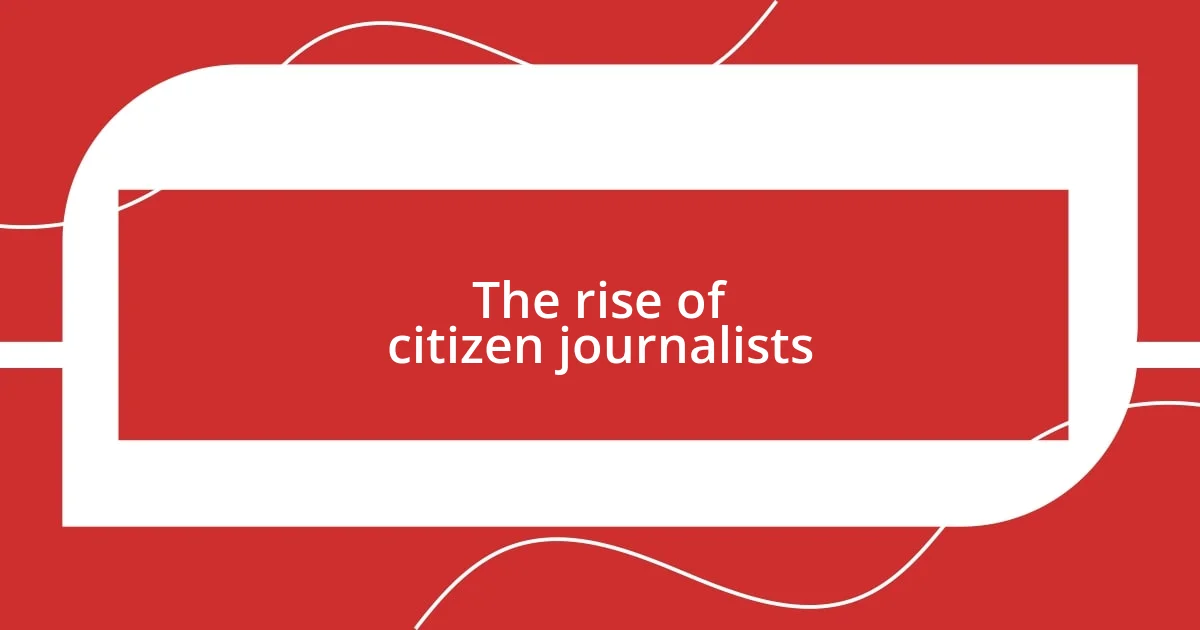
The rise of citizen journalists
The rise of citizen journalists has been a remarkable development in the political landscape. I recall a moment during a local protest when an ordinary attendee shared live updates on social media. It really struck me how someone without formal training could capture the spirit of the event, amplifying voices traditionally left out of the mainstream media narrative. This democratization of information is both exhilarating and a bit daunting; anyone can become a storyteller, but with that comes the challenges of accuracy and credibility.
- Citizen journalists can provide immediate, on-the-ground perspectives that mainstream media may overlook.
- They often cover local issues more intimately, giving a voice to underrepresented communities.
- The accessibility of smartphones and social media has lowered barriers for participation in journalism.
- While they can enhance political discourse, they may also spread misinformation if proper checks aren’t in place.
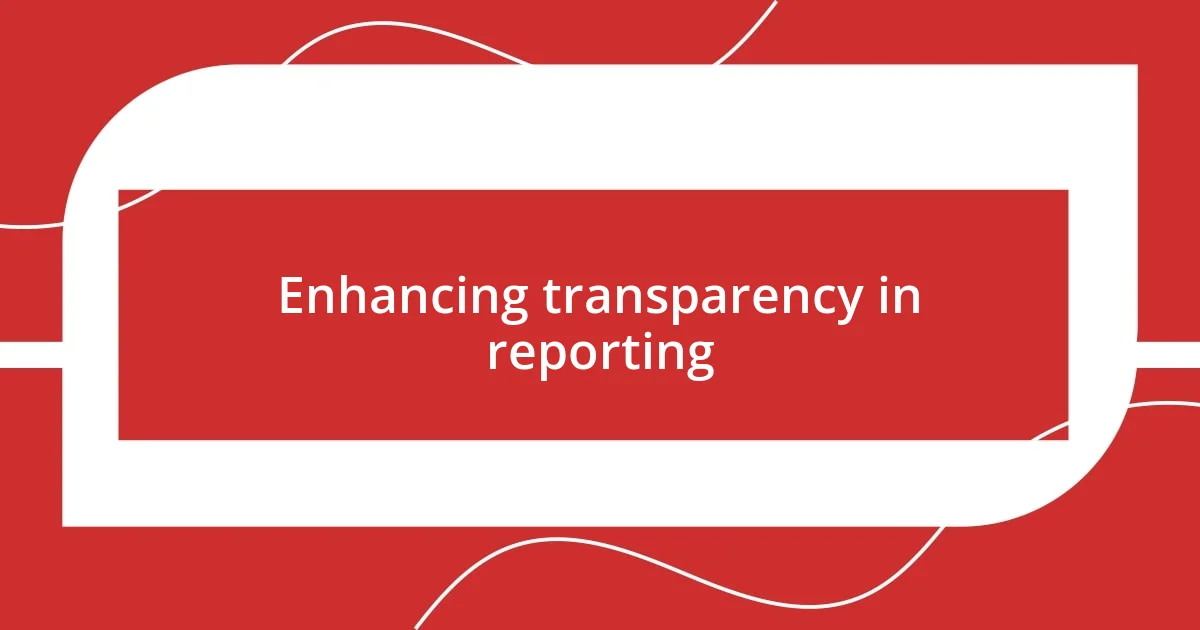
Enhancing transparency in reporting
In my experience, enhancing transparency in reporting begins with clear sourcing. I remember a particularly frustrating day when I stumbled upon an article claiming sensational facts with nothing to back it up. It made me think: how can we trust what we read if the origins of information are obscure? Journalists must prioritize clearly citing their sources, making it easier for readers to verify claims and understand the context behind the news.
I’ve noticed that some news organizations are embracing open editorial processes, allowing the public to view how stories are created. This openness not only engages readers but also holds journalists accountable. I’ve often asked myself, what if we could live-tweet the fact-checking process? Imagine the trust we could build with our audiences if they could witness the rigorous standards we apply before hitting ‘publish.’ Transparency isn’t just a buzzword; it’s the foundation for rebuilding faith in journalism.
Then there’s the role of media literacy in promoting transparency. I sometimes wonder how many readers actually understand the nuances of journalistic practices. From my own experience conducting workshops, I’ve seen firsthand how empowering people with knowledge about bias and fact-checking can transform how they consume news. By equipping audiences with these skills, we can collectively raise the bar for accountability and foster a more informed society, ensuring that transparency isn’t just an ideal but a regular practice in political journalism.
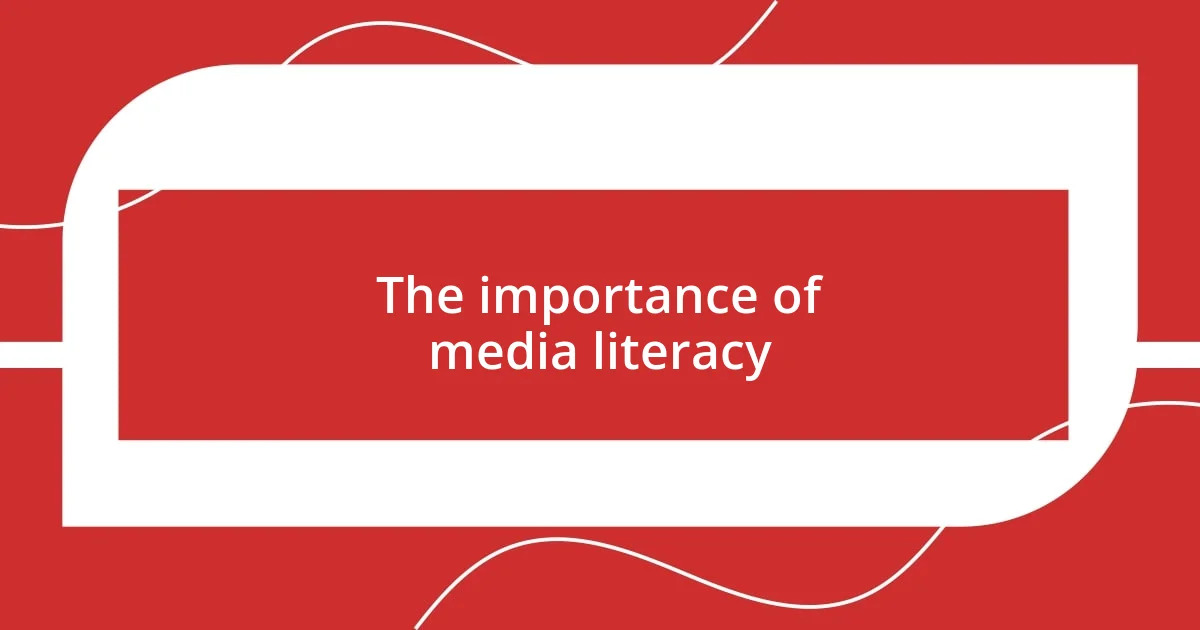
The importance of media literacy
Media literacy is essential in today’s fast-paced information landscape. I often think about a time when I encountered a viral meme passed off as a news story. It made me question: how many people stopped to verify this before sharing? This experience underscored for me just how crucial it is for individuals to develop skills that enable them to critically evaluate what they read—skills that can transform passive consumption into active, thoughtful engagement.
I vividly remember leading a community workshop focused on media literacy. The participants, initially skeptical, gradually became engaged as we dissected headlines together. I could see the light bulbs go off when they realized that sensationalist headlines often mask the real story. This moment reinforced my belief that the more people understand how media works, the more empowered they become to question narratives and seek the truth. It’s invigorating to think that enhancing media literacy can spark a ripple effect, encouraging critical thinking and healthier discourse.
Furthermore, media literacy doesn’t just protect individuals from misinformation; it bolsters democracy itself. One day, after discussing the impact of misinformation in politics, a participant asked, “What can we do to make a difference?” I felt a surge of hope at that moment because I knew that educated, informed individuals can demand better standards from media outlets. When people recognize their role as active participants in the ecosystem of information, we can collectively nurture a healthier political landscape, transforming responsibility into a shared endeavor.
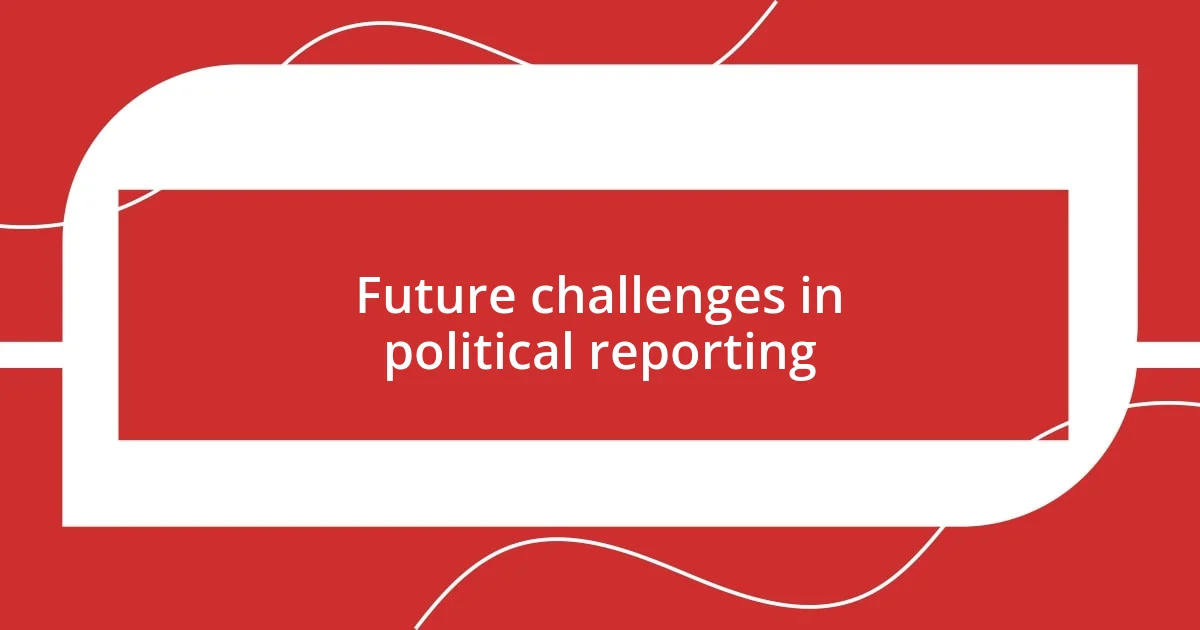
Future challenges in political reporting
I’ve often pondered the evolving landscape of political reporting, especially when considering the challenge of combating misinformation. I recall participating in a lively discussion at a local panel where a journalist shared their experience of fact-checking a high-profile politician’s statement that went viral. The audience was shocked to learn that what was deemed as “news” relied heavily on sensational claims that were misleading at best. This incident made me question: how do journalists maintain integrity in an era where speed often trumps accuracy? It’s this balance that will define political reporting in the coming years.
Another challenge lies in the rise of so-called “news deserts,” areas that lack reliable journalistic presence. I once visited a town where the sole newspaper had shut down, leaving residents reliant on social media for information. Witnessing their struggle to find trustworthy news deeply impacted me. The question I continually ask is, how can we ensure that every community has access to unbiased reporting? Addressing this issue requires innovation and collaboration, as harnessing community voices alongside traditional journalism might just be the solution to fill those gaps.
Lastly, the growing bifurcation in media consumption is a significant hurdle. I vividly remember discussing with a friend how our news feeds seemed to mirror our personal beliefs rather than offer diverse perspectives. This gut feeling points to a larger issue: the echo chamber effect. If media outlets continue to cater exclusively to specific ideologies, how can we facilitate constructive dialogue among differing viewpoints? To overcome this challenge, I believe that journalists must actively seek out and represent underreported perspectives, fostering a richer and more inclusive narrative that uplifts civil discourse.










